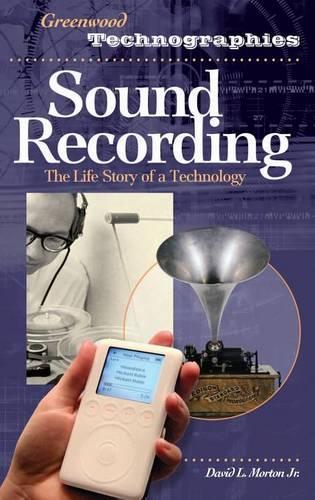
Sound Recording: The Life Story of a Technology
(Hardback)
Publishing Details
Sound Recording: The Life Story of a Technology
By (Author) David Morton
Bloomsbury Publishing PLC
Greenwood Press
30th September 2004
United States
Classifications
General
Non Fiction
History: specific events and topics
621.389309
Physical Properties
Hardback
240
Description
How did one of the great inventions of the 19th century - Thomas Edison's phonograph - eventually lead to one of the most culturally and economically significant technologies of the 20th and 21st centuries Sound Recording tells that story, tracing the history of the business boom and the cultural revolution begun by Edison's invention. Ever since, recorded sound has been all around us - not just in reproducing and playing popular music, but also in more mundane areas, such as office dictation machines, radio and television programmes, and even telephone answering machines. Just as the styles of music have evolved over the years, the formats on which this music was played have changed as well. The quest for better sound was one of the driving forces of technological change, but so too were business strategies, patent battles, and a host of other factors. Sound Recording contains information that will appeal anyone interested in the history of recorded music and sound technology, such as the following facts: The composer John Phillip Sousa once denounced sound recordings as a threat to good musical taste, but made many recordings over the years; The first modern "cassette" tape cartridge and the stereophonic LP record were both introduced by RCA in 1958. The tape cartridge flopped almost immediately; the stereo LP was the music industry's biggest hit ever; Chrysler automobiles of the late 1950s offered "Highway Hi-Fi," a dashboard phonograph that could play a record without skipping; The predecessor of the Compact Disc was a 12-inch home videodisc system from the late 1970s - the first of its kind - called DiscoVision. The volume includes a timeline and a bibliography.
Reviews
[H]ighly recommended for specialty collections....[t]ells the story of objects and technologies important to the evolution of the recorded music industry over the years. From 8-tracks up to CDs and beyond, this traces the history of a business boom which began with Edison's invention and continues to this day, in the process revealing intriguing glimpses of inventions which never quite made it.-MBR Internet Bookwatch/The Bookwatch
[R]ecounts the history of recorded music and sound technology from Thomas Edison's invention of the phonograph to the present day.-SciTech Book News
Sound Recording traces the development of sound technology in the US and Europe from the first demonstration of the phono-autograph in 1857 to the latest MP3 technology. Morton skillfully blends a basic understanding of the physical principles involved in recording sound waves with an interesting chronological account that examines the cultural and economic issues affecting the development of sound technology. The inclusion of the discoveries of European inventors adds depth and dimension to this account; it really underscores the power and continuing influence that everyone involved had on the development of a common method of capturing sound waves. Sound Recording is written in an engaging style for general readers and includes references to primary and scholarly resources for readers who want to learn more....Recommended. General readers; lower- and upper-division undergraduates; two-year technical program students.-Choice
[V]aluable.- CBQ Communications Booknotes Quarterly
[V]aluable.-CBQ Communications Booknotes Quarterly
[V]aluable.CBQ Communications Booknotes Quarterly
"Highly recommended for specialty collections....tells the story of objects and technologies important to the evolution of the recorded music industry over the years. From 8-tracks up to CDs and beyond, this traces the history of a business boom which began with Edison's invention and continues to this day, in the process revealing intriguing glimpses of inventions which never quite made it."-MBR Internet Bookwatch/The Bookwatch
"Recounts the history of recorded music and sound technology from Thomas Edison's invention of the phonograph to the present day."-SciTech Book News
"Valuable."-CBQ Communications Booknotes Quarterly
"[V]aluable."-CBQ Communications Booknotes Quarterly
"[H]ighly recommended for specialty collections....[t]ells the story of objects and technologies important to the evolution of the recorded music industry over the years. From 8-tracks up to CDs and beyond, this traces the history of a business boom which began with Edison's invention and continues to this day, in the process revealing intriguing glimpses of inventions which never quite made it."-MBR Internet Bookwatch/The Bookwatch
"[R]ecounts the history of recorded music and sound technology from Thomas Edison's invention of the phonograph to the present day."-SciTech Book News
"Sound Recording traces the development of sound technology in the US and Europe from the first demonstration of the phono-autograph in 1857 to the latest MP3 technology. Morton skillfully blends a basic understanding of the physical principles involved in recording sound waves with an interesting chronological account that examines the cultural and economic issues affecting the development of sound technology. The inclusion of the discoveries of European inventors adds depth and dimension to this account; it really underscores the power and continuing influence that everyone involved had on the development of a common method of capturing sound waves. Sound Recording is written in an engaging style for general readers and includes references to primary and scholarly resources for readers who want to learn more....Recommended. General readers; lower- and upper-division undergraduates; two-year technical program students."-Choice
Author Bio
David L. Morton Jr. is a freelance writer who lives and works in Tucker, Georgia.
